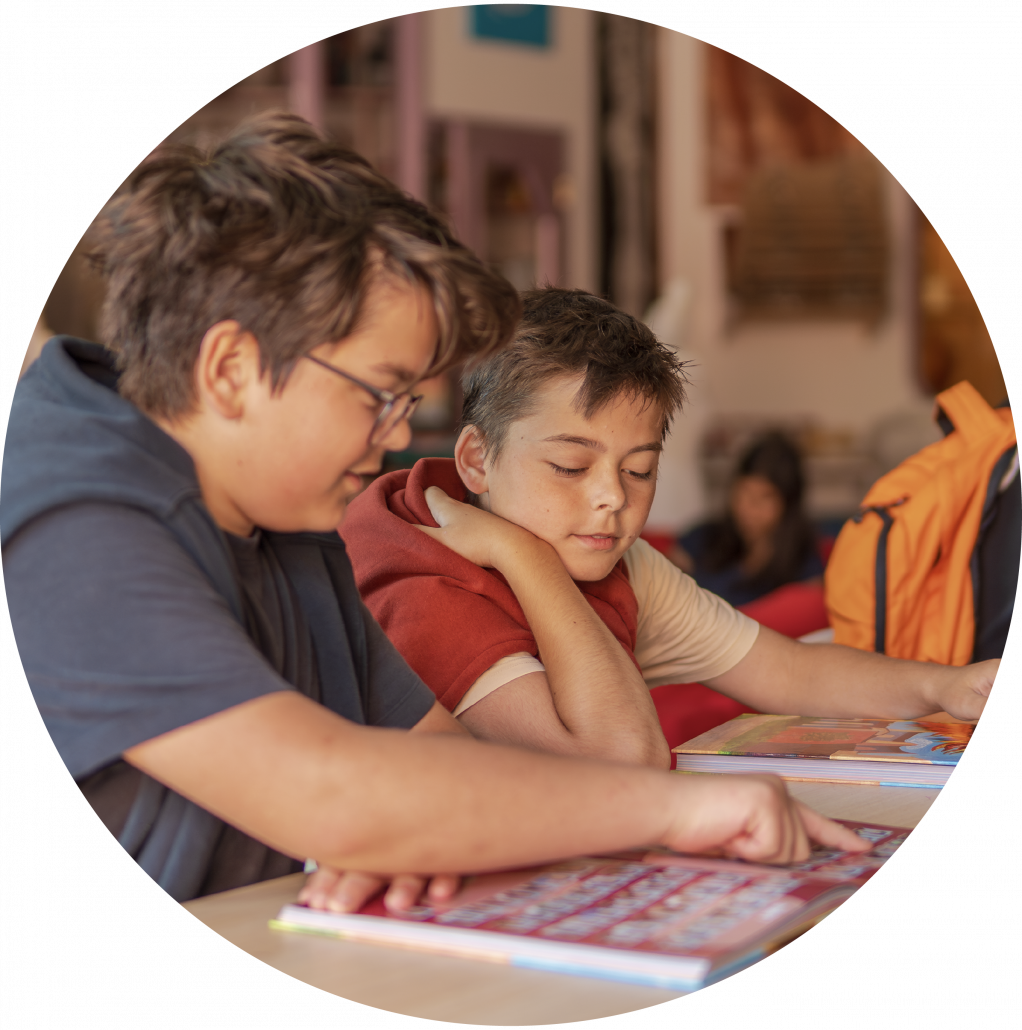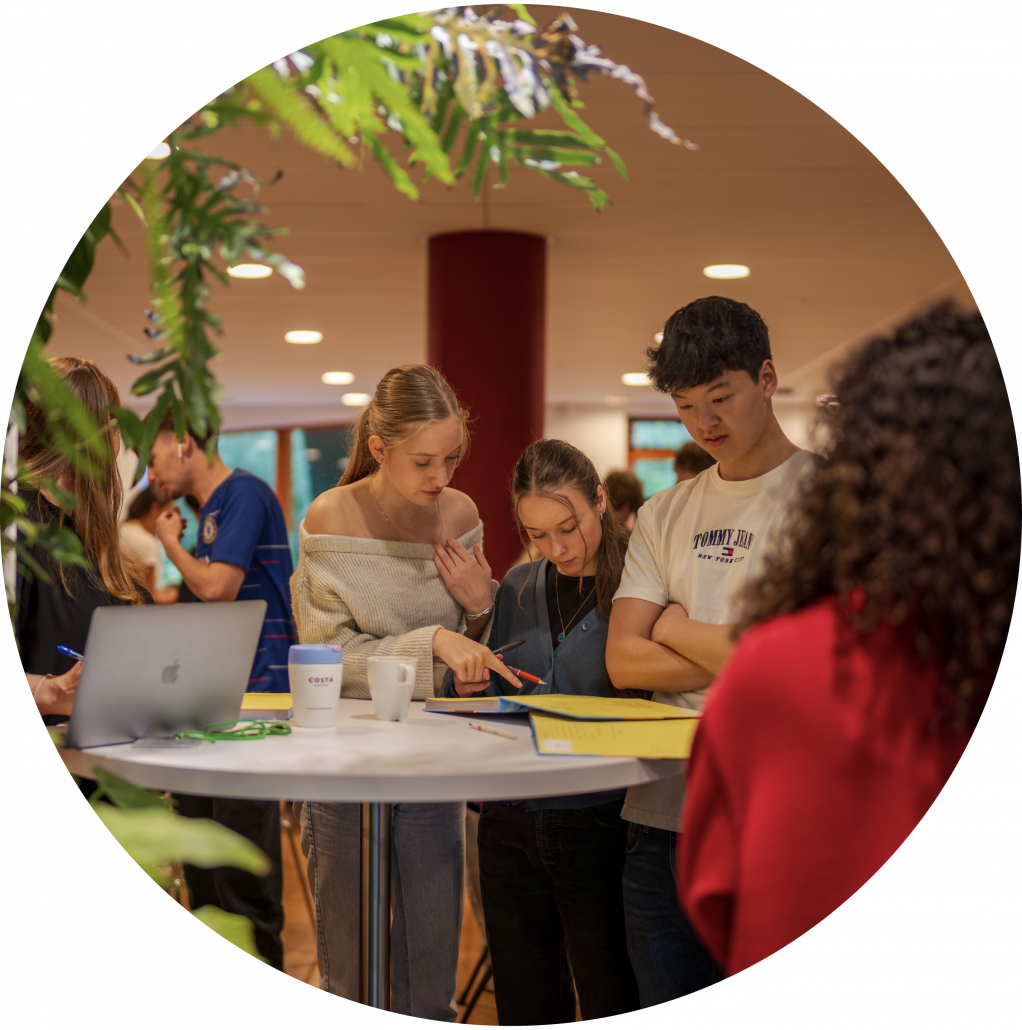Lower School Learning Support & Counselling
In Lower School, the teachers are generally able to address the diverse needs of their students within their classes. Teachers are available to discuss concerns with parents as needs arise. The homeroom teacher is the first point of contact if issues do occur. Additionally, teachers and the counsellors from the Student Support Department (SSD) are available to offer advice to parents and support to students.
Lower School Student Support Department (SSD)
Our SSD team’s aim is to provide support to students whose academic needs are significantly different to the majority of pupils in their age/class group. They provide academic support to students in different types of small groups, depending on need and specialist evaluation. Some students may be withdrawn from additional language lessons e.g. Dutch classes, in order to access SSD support. Other students will receive this support during homeroom time e.g. math support during class time for mathematics. Group targets will be identified for students receiving support and assessments against criteria and the specific targets will be developed to monitor progress. Written progress reports are distributed periodically to parents, teachers and the SSD coordinator.
If a teacher or a parent has a concern about their child having significant needs that are not being met through the regular programme, there is a referral procedure to be followed. Further information about this procedure, which may include in-class observations, screening and external evaluations, can be obtained from the SSD Coordinator.
External Testing
External testing and/or specialised individual support is privately funded by parents/guardians, and includes psycho-educational evaluations, speech and language therapy, occupational therapy, play and drama therapy and individual tutoring.
Tutoring
Any tutoring taking place outside of school hours is to be arranged by the parents and the tutor and is not supervised by the SSD coordinator. Any tutoring that you wish to take place on the school campus during school hours must be approved by the Head of Lower School and payment must be processed through the Business Office.
General Counselling
The Lower School Counsellors meet with students individually or in small groups. These occasional meetings do not require a permission form. However, if a student meets regularly with a Counsellor, parent permission is required.
Counsellors also support lessons focusing on supporting the Personal, Social and Emotional Curriculum, for example when teaching concepts such as friendships, conflict and responsibility. Some of these lessons may be integrated into the Units of Inquiry. Children who are new to ISA, or those leaving, are supported by a Counsellor during these periods of transition.
Upper School Learning Support & Counselling
The Upper School Student Support department including counsellors and learning support teachers work with parents, teachers, external professionals and students to provide coordinated services and support for students.
General Counselling
The Upper School Counselling department includes two counsellors for grades 6 through 8; a counsellor each for grades 9 and 10; and two counsellors for grades 11-12.
Counsellors provide personal/social, transition, academic, and career counselling to assist with the well-being of all students. Counsellors may work with individual students, small groups, and through the ISA homeroom and advisory programmes to provide developmentally appropriate prevention and intervention services. Consultation and collaboration with parents and teachers are also provided.
Outside agency resource information for families including private psychologists for counselling and educational evaluations may be requested through the counselling department.
Learning Support
Learning Support teachers work with students, faculty, and parents to support students with diagnosed learning needs. An Individualised Learning Plan (ILP) is developed for students with documented learning needs to outline the student’s strengths, challenges, classroom strategies, and accommodations. Academic support may be provided to students through a variety of methods including Learning Support class, monitoring of academic needs and progress, support within classes, collaboration with classroom teachers, and/or accommodations in the classroom and for assessments.
External testing to identify educational needs is privately funded by parents/guardians. Evaluations to update a student’s educational needs are generally required every three years or as requested by ISA to continue receiving Learning Support services, accommodations, and/or external testing accommodations (i.e. for IB exams)>
Assistance is available with applications for possible external testing accommodations such as for College Board, ACT, and the IB assessments.
Confidential records including Individual Learning Plans and psychoeducational testing reports may only be released to others schools or agencies with parental/guardian permission.
College and University Counselling
Students also receive assistance with post-secondary planning including applying to institutions of higher education and gap-year experiences. Information is provided through group sessions and in individual meetings with students and parents. Reference materials and information regarding worldwide university entrance requirements and procedures are available in the counselling office.
ISA has a positive, transparent relationship with many universities around the world. For these trusting relationships to continue, students must agree to maintain honesty throughout the university application process. Counsellors and ISA are obliged to inform colleges and universities about any serious infractions of school rules. ISA recommendation letters for universities and other programs are confidential.
University representatives visit ISA to meet with parents and students throughout the year. Several college fairs are also held at ISA and throughout The Netherlands. Information on visits and fairs are posted on the Veracross calendar and in the Weekly Update, an email newsletter sent out to the ISA community every Friday at 16:30.
Testing for College and University
Testing information and academic advising sessions are also part of the counselling process. It is important to discuss the testing requirements of the universities to which students are applying to determine the most appropriate tests. Specific dates and more information are available on the Veracross calendar.
The PSAT (Preliminary Scholastic Aptitude Test), SAT (Scholastic Aptitude Test), and SAT Subject area tests are administered at ISA. Twice a year, SAT preparation courses are offered to interested students by an outside company. The cost of the testing and/or preparation course is to be met by the families.
The ACT (American College Test) is administered at the American School of The Hague.
In grade 10, the PSAT is offered to students in October. Parents are responsible for the PSAT costs and registration.
The PSAT will also be offered to grade 11 students in October. Parents are responsible for the PSAT costs and registration. Grade 11 students should register to take the SAT Test during the grade 11 school year. The earliest recommended testing date is December, although most grade 11 students take the SAT in January.
The TOEFL (Test of English as a Foreign Language) may be required by some US and Japanese universities. Testing is done at external sites in the Amsterdam area.
The IELTS (International English Language Testing System) exam may be required by UK universities for students whose first language is not English. These are given at the British Council of Amsterdam.
Information for University Representatives
Please view our most recent school profile for information about our students, including demographic information, IBDP scores and university acceptances.
University Representative Visits
ISA hosts numerous colleges and universities throughout the school year. We encourage colleges and universities to contact our office to schedule a visit. We will do our very best to accommodate your visit requests.
Most university visits occur during the student’s lunch which is:
Monday-Thursday 12:15-13:15
Friday 12:35-13:35
Visits are welcome any day of the week. Once a day and time has been arranged, we will promote the visit and encourage ISA students and parents to attend.
For more details about our school holidays, please view our school calendar.
Lower School Counselling Contacts
Eli Arenas Thomas
Early Childhood Counsellor
earenas@isa.nl
Whitney Horsham
Lower School Counsellor
whorsham@isa.nl
Janette Glave
Lower School Counsellor
jglave@isa.nl
Heidi Raikowski
Learning Support Coordinator
hraikowski@isa.nl
Upper School Counselling Contacts
Tricia Scarlata
Counsellor: grades 6-8
tscarlata@isa.nl
Valerie Hoglan
Counsellor: grades 6-8
vhoglan@isa.nl
Patille Bingham
Counsellor: grades 9 & 10
pbingham@isa.nl
Katie Bangs
Counsellor: grades 9 & 10
kbangs@isa.nl
Tami Albrecht
Counsellor: grades 11 & 12
talbrecht@isa.nl
Liz Kozodoy
Counsellor: grades 11 & 12
lkozodoy@isa.nl
Robbie Jefferis
Counsellor: grades 11 & 12
rjefferiss@isa.nl
Upper School Learning Support Contacts
Colleen Doyle
Upper School Learning Support
colleendoyle@isa.nl
Juan Chen
Upper School Learning Support
jchen@isa.nl
Todd Hanneman
Upper School Learning Support
thanneman@isa.nl
Jodi Klue
Upper School Learning Support
jklue@isa.nl




